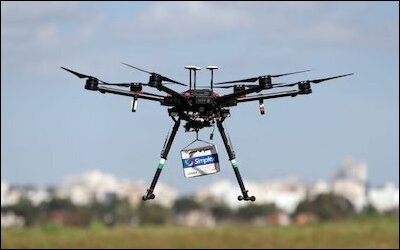by Seth J. Frantzman
Israel is embarking on an initiative called the Naama Project that aims to create a national drone network for commercial delivery, medical transport and urban air mobility.
Excerpts of article originally published under the title "Israel Wants to Create a National Drone Network: A Game Changer?"
 A new initiative called Naama (a Hebrew acronym for urban aerial transport) would open Israel's skies to commercial drone deliveries. |
Soon skies could be filled with drones, like highways in the air, with the machines delivering essential items on predefined routes. While rumors of drones delivering pizza or products have circulated for years, often without much success, Israel is embarking on an initiative called the Naama Project that aims to create a national drone network for commercial delivery, medical transport and urban air mobility.
According to a report on March 17 from the Israel Innovation Authority, the pilot program and initiative has achieved significant progress over the last year. The Israel Innovation Authority partnered with the Israel Ministry of Transport through the Ayalon Highways Company, the Civil Aviation Authority of Israel (CAAI) and the Smart Mobility Initiative at the Israeli Prime Minister's Office. They are working at "shaping the future of mobility, introducing a national drone network that will primarily enable cargo transportation in urban areas through smart and innovative airspace management."
The first-of-its-kind pilot envisions a large number of drones operated by several companies flying over the city of Hadera. "Those sorties will be managed by one centralized, autonomous Unmanned Aircraft System Traffic Management (UTM) located in the traffic and air traffic control centers of the Ayalon Highway Company in the central Haifa Bay." The goal is to reach 300 sorties a day. "Each drone will be simulating the execution of various types of tasks and operations: food delivery, transporting medicine and medical equipment, agricultural services and many others." In early 2020, an Israeli government steering committee was established to support and promote a national drone network operation under the Naama Initiative" (a Hebrew acronym for urban aerial transport).
The Naama initiative builds on Israel's overall historic success as a center in drone innovation. |
Itamar Ben Meir, CEO Ayalon Highways, said that "a smart traffic management and air traffic control center that manages and prioritizes a number of drones flying simultaneously in one geographic airspace is a remarkable achievement, setting the stage for the future of mobility applications, a field in which Ayalon Highways is primed to play a leading role." He said that this demonstration is part of a long list of technological and regulatory developments required for the commercial operation of a national low-altitude air traffic network for drones in urban settings.
The initiative builds on Israel's overall historic success as a center in drone innovation and high-technology. Israeli companies have pioneered a plethora of types of drones, many of them in the defense realm but now also in the civilian airspace. Consider, for instance, the StarLiner by Elbit Systems, a larger drone designed to function in non-segregated civilian airspace. ...
The concept is to have up to twenty drones flying simultaneously and hundreds scheduled in a path over several weeks. "This is the first such demonstration in Israel out of a series of eight planned to take place over the next two years. This is a significant global breakthrough in the ability to manage drone operations at scale, which will lay the foundation for future national drone operations in many areas. To support the current phase of the pilot, the participating companies have been granted funds by the Israel Innovation Authority, as part of the Innovation Authority Piloting Fund Program," the organizers said.
The Naama initiative seeks to reduce congestion on public roads and deliver goods more quickly. |
The concept has been gaining momentum since March 2020. With the Ministry of Transport and Civil Aviation Authority of Israel, the Naama initiative's project was established to "enable drones to be deployed for the public good, ultimately reducing congestion on public roads, transporting medicine and medical equipment and performing medical tasks, delivering various commercial goods more quickly, and enabling Urban Air Mobility (UAM) to function at scale in the future."
"One of the Israel Innovation Authority's most important goals is to harness Israeli technology and innovation in a way that will make a positive impact on the Israeli population," said Ami Appelbaum, Chairman of the Israel Innovation Authority. "Until a year ago, when the NAAMA Initiative was established, transporting cargo and delivering medical equipment by drones would have seemed like a distant dream." Now it is closer to reality.
Israel's initiative in creating a potential drone transport network is a step forward in trying to segregate airspace for drones and also provide a kind of route map for where they might operate. Then the next step is to make it so they can go on their routes autonomously and not run into each other. Israel already pioneers a lot of technology that helps drones do this and Israel has the advances in artificial intelligence and other methods that can benefit drones to take-off, land and perform tasks without a person always in the loop. The next step will be to see if the drones can actually perform their tasks. If that happens then there could conceivably be drone ports or masts or tops of buildings where the drones come and go, delivering things. This would be more akin to the old networks of Zeppelins that once roamed the skies, then the fantasies of drones bringing pizza to someone's door. It would be a kind of alternative shipping network for relatively lightweight payloads. That is because today's drones in civilian airspace are not very large and a lot of work would need to go into making military-size drones useful for civilian transport.
Seth J. Frantzman is a Ginsburg-Milstein Writing Fellow at the Middle East Forum and senior Middle East correspondent at The Jerusalem Post.
Source: https://www.meforum.org/62139/israel-wants-to-create-a-national-drone-network
No comments:
Post a Comment